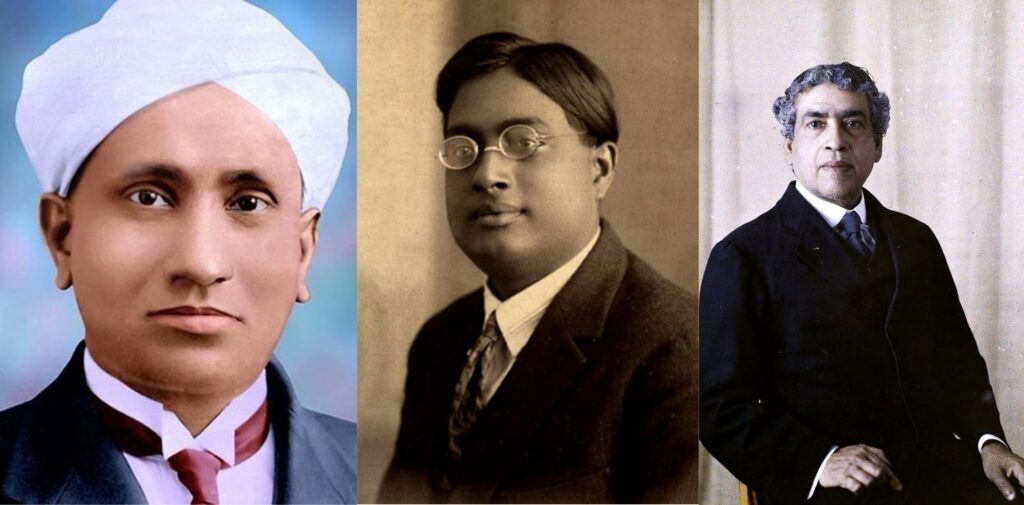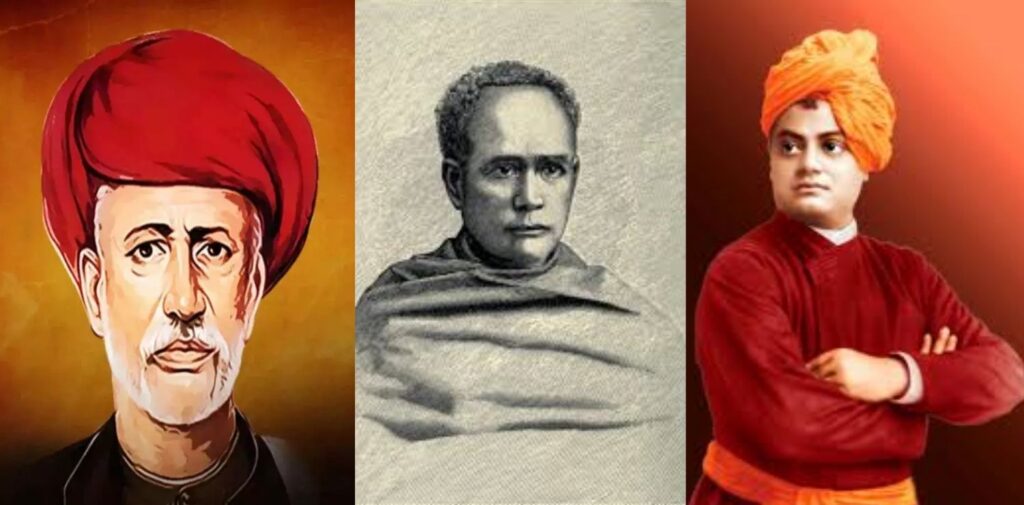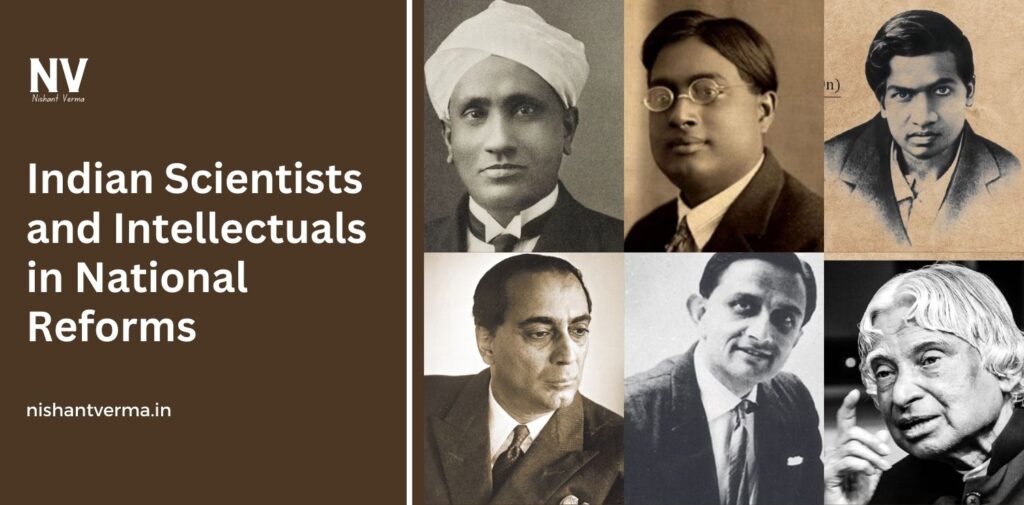The Indian freedom struggle was not only about political leaders and mass movements. It was also about the contributions of intellectuals, scientists, and reformers who played a crucial role in shaping the nation’s social, cultural, and intellectual landscape. These individuals helped challenge colonial ideologies, provided new ways of thinking, and contributed to the overall progress of India. Their work in fields such as science, education, literature, social reform, and philosophy significantly influenced the national reform movements that paved the way for India’s independence.
In this article, we will explore the roles of Indian scientists and intellectuals in national reforms and how their contributions impacted India’s journey toward independence and social change.
The Role of Indian Scientists and Intellectuals in National Reforms
India’s fight for independence was not just a political struggle; it was also an intellectual battle against colonial rule and its oppressive structures. Colonialism had stifled India’s progress in many areas, and Indian scientists and intellectuals took it upon themselves to challenge these limitations and show the world the potential of Indian thought and scientific knowledge.
Challenging Colonial Thought and Ideology
One of the earliest and most important contributions of Indian intellectuals was in challenging the colonial education system and its efforts to undermine India’s native knowledge systems. British colonialists established educational institutions in India with the primary aim of creating a class of Indians who could serve the British administration. The education system focused on English literature, history, and Western philosophy, while Indian culture, history, and traditions were sidelined.
However, many Indian intellectuals and reformers worked to revive and preserve India’s rich intellectual heritage. One such individual was Raja Ram Mohan Roy, a social and religious reformer who is often called the “Father of the Indian Renaissance.” He was instrumental in the establishment of modern education and the promotion of scientific thought in India. His efforts to bring a rational, scientific approach to religious practices and society challenged the traditional, conservative structures that had existed for centuries.

Scientists and National Reforms: Pioneers of Scientific Thought
Indian scientists also made significant contributions to national reforms. They were not just involved in scientific discovery but were also dedicated to improving the conditions of their fellow countrymen. Their work helped challenge the stereotype of India as a nation unable to progress scientifically or technologically under British rule.
Sir C.V. Raman, one of India’s most famous scientists, is known for his groundbreaking work in the field of physics, particularly the Raman Effect, which won him the Nobel Prize in Physics in 1930. His work not only contributed to global scientific knowledge but also inspired a sense of pride and self-belief among Indians. His achievement stood as evidence that India had the potential to contribute to the world of science and knowledge.
Another important figure was J.C. Bose, a scientist, and inventor who made pioneering contributions to the study of plant physiology, radio waves, and microwave optics. His research into the properties of plants helped revolutionize the field of botany and encouraged people to look at nature and the environment through a scientific lens. Bose’s work also contributed to the creation of a scientific culture in India, where scientists were encouraged to think beyond colonial limitations and pursue innovation.
Satyendra Nath Bose, another renowned scientist, is known for his work in the field of theoretical physics. He collaborated with Albert Einstein to develop the theory of Bose-Einstein Condensation, which was later recognized as one of the most important discoveries in the world of physics. His contributions to science helped bring India to the forefront of global intellectual and scientific achievement.

Intellectuals and Social Reform Movements
Apart from scientific work, intellectuals also played a pivotal role in social reform movements in India. Social reformers like Ishwar Chandra Vidyasagar, Jyotirao Phule, and Swami Vivekananda used their intellectual abilities to challenge oppressive social practices and push for national reforms.
- Ishwar Chandra Vidyasagar was an educator, social reformer, and writer who fought for women’s rights and the abolition of the practice of Sati (the burning of widows). His book “Bangalir Itihas” (History of Bengal) also discussed the social history of Bengal, showing the importance of education in transforming society. Vidyasagar was an advocate for women’s education and was instrumental in passing the Hindu Widow Remarriage Act in 1856, which legalized the remarriage of widows. His ideas and actions helped uplift marginalized sections of society, particularly women.
- Jyotirao Phule, a social reformer from Maharashtra, was a pioneer in the fight against untouchability and caste-based discrimination. He established schools for lower-caste children and worked to dismantle the rigid caste system. His intellectual approach to social reform was revolutionary and helped lay the foundation for movements that would later advocate for equality and justice, such as the Dalit movement.
- Swami Vivekananda, one of the most influential spiritual and intellectual leaders of modern India, is known for his speeches at the Parliament of the World’s Religions in Chicago in 1893. Vivekananda emphasized the importance of spirituality in modern life and encouraged Indians to take pride in their cultural and spiritual heritage. He advocated for education and social service as tools for national upliftment and encouraged the youth to work towards national progress. His intellectual contributions were not just philosophical but practical, as he worked to create institutions like the Ramakrishna Mission to serve the public and foster social harmony.
The Role of Indian Intellectuals in the Freedom Struggle
Indian intellectuals played a significant role in the freedom struggle, not only by advocating for self-rule but also by challenging colonial thought and fostering a national identity. Rabindranath Tagore, a poet, philosopher, and educator, was a prominent intellectual figure who spoke out against British colonial rule and inspired people with his writings and ideas. Tagore believed that true freedom could only be achieved by a cultural and intellectual awakening, and his works, including his poems, essays, and songs, contributed greatly to the nationalist movement.
Lala Lajpat Rai, a prominent nationalist leader and intellectual, advocated for social reforms as well as political freedom. He was a strong supporter of Swadeshi (self-reliance) and promoted the boycott of foreign goods. Rai’s intellectual contributions helped mobilize people for the Non-Cooperation Movement and the Quit India Movement. He played an essential role in spreading nationalist ideas through his writings and speeches.
Other notable intellectuals, such as Subramania Bharati and Mahatma Gandhi, contributed to the Indian national movement by promoting social and cultural reforms. Gandhi’s emphasis on Ahimsa (non-violence) and Satyagraha (truth-force) became a central part of the Indian freedom struggle. His intellectual leadership not only led to the eventual achievement of independence but also to the transformation of Indian society through social reforms, such as the eradication of untouchability and the promotion of communal harmony.

Promoting Scientific and Technological Advancements
While political leaders fought for India’s independence, scientists and intellectuals also focused on creating a scientifically progressive India. The establishment of scientific institutions like the Indian Institute of Science in 1909 and the Indian Statistical Institute in 1931 helped lay the foundation for India’s scientific community.
Indian intellectuals worked to ensure that India could stand on its own feet after independence. They focused on creating infrastructure, promoting technology, and fostering education. Scientists and reformers like Dr. B.C. Roy, who later became the Chief Minister of West Bengal, played a key role in building post-independence India. He advocated for healthcare, education, and the development of science and technology in India.
Conclusion
The contributions of Indian scientists and intellectuals in the national reforms were invaluable. These individuals not only played a vital role in India’s freedom struggle but also in shaping the social, educational, and scientific future of India. They used their knowledge, ideas, and intellect to challenge colonial rule, promote reforms, and lay the groundwork for a progressive and independent India.
Their work in science, education, and social reform, combined with their ability to inspire the masses, helped break free from the shackles of colonialism and led to the creation of a new India—one that was intellectually vibrant, scientifically advanced, and socially just. These intellectual giants continue to inspire future generations, reminding us of the importance of knowledge, education, and social justice in building a better society.




